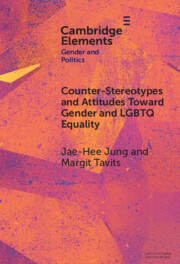63 results

Counter-Stereotypes and Attitudes Toward Gender and LGBTQ Equality
-
- Published online:
- 22 March 2024
- Print publication:
- 11 April 2024
-
- Element
- Export citation
Fixed Effects and Post-Treatment Bias in Legacy Studies
-
- Journal:
- American Political Science Review / Volume 118 / Issue 1 / February 2024
- Published online by Cambridge University Press:
- 24 January 2024, pp. 537-544
- Print publication:
- February 2024
-
- Article
-
- You have access
- Open access
- HTML
- Export citation
Fathers’ Leave Reduces Sexist Attitudes
-
- Journal:
- American Political Science Review / Volume 118 / Issue 1 / February 2024
- Published online by Cambridge University Press:
- 26 April 2023, pp. 488-494
- Print publication:
- February 2024
-
- Article
-
- You have access
- Open access
- HTML
- Export citation
Can Policy Responses to Pandemics Reduce Mass Fear?
-
- Journal:
- Journal of Experimental Political Science / Volume 10 / Issue 3 / Winter 2023
- Published online by Cambridge University Press:
- 21 April 2022, pp. 343-353
-
- Article
-
- You have access
- Open access
- HTML
- Export citation
Can political speech foster tolerance of immigrants?
-
- Journal:
- Political Science Research and Methods / Volume 10 / Issue 3 / July 2022
- Published online by Cambridge University Press:
- 15 July 2021, pp. 567-583
-
- Article
- Export citation
Western Political Rhetoric and Radicalization
-
- Journal:
- British Journal of Political Science / Volume 52 / Issue 1 / January 2022
- Published online by Cambridge University Press:
- 22 December 2020, pp. 437-444
- Print publication:
- January 2022
-
- Article
- Export citation
Shared interests foster interethnic cooperation among politicians
-
- Journal:
- Political Science Research and Methods / Volume 9 / Issue 3 / July 2021
- Published online by Cambridge University Press:
- 23 April 2020, pp. 627-640
-
- Article
-
- You have access
- Open access
- HTML
- Export citation
Wartime Violence and Post-War Women's Representation
-
- Journal:
- British Journal of Political Science / Volume 51 / Issue 3 / July 2021
- Published online by Cambridge University Press:
- 28 February 2020, pp. 1024-1039
- Print publication:
- July 2021
-
- Article
- Export citation
Legacies of the Third Reich: Concentration Camps and Out-group Intolerance
-
- Journal:
- American Political Science Review / Volume 114 / Issue 2 / May 2020
- Published online by Cambridge University Press:
- 27 January 2020, pp. 573-590
- Print publication:
- May 2020
-
- Article
- Export citation
Language Heightens the Political Salience of Ethnic Divisions
-
- Journal:
- Journal of Experimental Political Science / Volume 6 / Issue 2 / Summer 2019
- Published online by Cambridge University Press:
- 27 November 2018, pp. 131-140
-
- Article
- Export citation
How Exposure to Violence Affects Ethnic Voting
-
- Journal:
- British Journal of Political Science / Volume 50 / Issue 1 / January 2020
- Published online by Cambridge University Press:
- 04 December 2017, pp. 345-362
- Print publication:
- January 2020
-
- Article
- Export citation
Appendix 5.1 - Vote choice question wording
-
- Book:
- Clarity of Responsibility, Accountability, and Corruption
- Published online:
- 05 July 2016
- Print publication:
- 14 July 2016, pp 158-162
-
- Chapter
- Export citation
Copyright page
-
- Book:
- Clarity of Responsibility, Accountability, and Corruption
- Published online:
- 05 July 2016
- Print publication:
- 14 July 2016, pp iv-iv
-
- Chapter
- Export citation
Appendix 5.2 - Descriptive statistics from CSES and ISSP surveys
-
- Book:
- Clarity of Responsibility, Accountability, and Corruption
- Published online:
- 05 July 2016
- Print publication:
- 14 July 2016, pp 163-163
-
- Chapter
- Export citation
Appendix 5.3 - Additional tables and figures from CSES and ISSP models
-
- Book:
- Clarity of Responsibility, Accountability, and Corruption
- Published online:
- 05 July 2016
- Print publication:
- 14 July 2016, pp 165-168
-
- Chapter
- Export citation
7 - Elite anticorruption efforts
-
- Book:
- Clarity of Responsibility, Accountability, and Corruption
- Published online:
- 05 July 2016
- Print publication:
- 14 July 2016, pp 107-124
-
- Chapter
- Export citation
Figures
-
- Book:
- Clarity of Responsibility, Accountability, and Corruption
- Published online:
- 05 July 2016
- Print publication:
- 14 July 2016, pp ix-xii
-
- Chapter
- Export citation
Appendices
-
- Book:
- Clarity of Responsibility, Accountability, and Corruption
- Published online:
- 05 July 2016
- Print publication:
- 14 July 2016, pp 157-176
-
- Chapter
- Export citation
Appendix 8.1 - Descriptive statistics and additional models for Chapter 8
-
- Book:
- Clarity of Responsibility, Accountability, and Corruption
- Published online:
- 05 July 2016
- Print publication:
- 14 July 2016, pp 173-173
-
- Chapter
- Export citation
1 - Introduction
-
- Book:
- Clarity of Responsibility, Accountability, and Corruption
- Published online:
- 05 July 2016
- Print publication:
- 14 July 2016, pp 1-16
-
- Chapter
- Export citation



